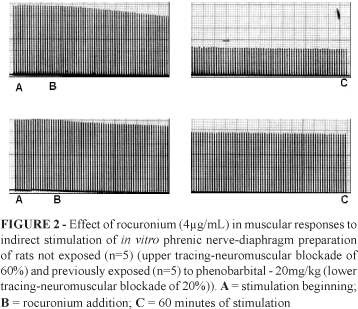PURPOSE: To evaluate in vitro and in vivo neuromuscular blockade produced by rocuronium in rats treated with Phenobarbital and to determine cytochrome P450 and cytochrome b5 concentrations in hepatic microsomes. METHODS: Thirty rats were included in the study and distributed into 6 groups of 5 animals each. Rats were treated for seven days with phenobarbital (20 mg/kg) and the following parameters were evaluated: 1) the amplitude of muscle response in the preparation of rats exposed to phenobarbital; 2) rocuronium effect on rat preparation exposed or not to phenobarbital; 3) concentrations of cytochrome P450 and cytochrome b5 in hepatic microsomes isolated from rats exposed or not to phenobarbital. The concentration and dose of rocuronium used in vitro and in vivo experiments were 4 µg/mL and 0,6 mg/kg, respectively. RESULTS: Phenobarbital in vitro and in vivo did not alter the amplitude of muscle response. The neuromuscular blockade in vitro produced by rocuronium was significantly different (p=0.019) between exposed (20%) and not exposed (60%) rats; the blockade in vivo was significantly greater (p=0.0081) in treated rats (93.4%). The enzymatic concentrations were significantly greater in rats exposed to phenobarbital. CONCLUSIONS: Phenobarbital alone did not compromise neuromuscular transmission. It produced enzymatic induction, and neuromuscular blockade in vivo produced by rocuronium was potentiated by phenobarbital.
Phenobarbital; Neuromuscular Blocking Agents; Rats



